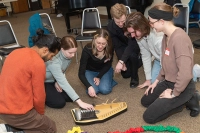Many students erroneously believe that if they are placed in a level beyond 101, it is a death sentence. Some insist that they cannot do the work because they " have forgotten everything" or simply had "a bad teacher in high school". Here at Marywood, you will be placed with other students with similar backgrounds and learning experience. You will be expected to learn what you are taught. If you can speak and understand everything the first day, you will be advanced to the next level. Learning a foreign language is a practical, but exciting journey that will yield many opportunities over your lifetime. The professors are here to guide you each step of the way and to challenge you to excel.

Afraid of That Foreign Language Class? Find out What to Expect
Published
Go for the Excitement: New Ways of Language Learning
What Can You Expect?
You will learn a second language in exciting new ways, using technology and focusing on communication. Learning a language is not just learning grammar and vocabulary; it is learning new sounds, expressions, and ways of seeing things; it is learning how to act in another culture, how to know a new community from the inside.
When Should You Start and How Much Can You Learn?
You are never too young and it is never too late to begin. Depending on how long you study, you can gain different levels of fluency. You will probably not sound like a native speaker who has spoken the language at home as a child. Don't worry; you're not expected to. To a greater or lesser degree, you will, however, make yourself understood, read magazines or books for pleasure or information, and meet and talk with new groups of people. Of course, it doesn't happen overnight. Like learning math, history, or playing the piano, language learning takes time. And it adds to who you are.
Should You Continue Language Study After High School?
Yes! Don't waste your investment of time and effort; whatever you have learned is a foundation for further study. Stick with it. Use your second language on the job; seek out opportunities to use it in your community; in college, take more courses, study abroad at intersession or for a summer, a semester, or a year. Some programs teach languages in conjunction with engineering, business, nursing, or journalism. And you might decide to start yet another language. When you study a language, you learn about how to learn a language, so learning the next one is easier.
Which Language should you learn?
There's no one answer. Here are the twelve most likely to be offered in your high school or college: Spanish, French, German, Italian, Japanese, Latin, Russian, Hebrew, Greek, Chinese, Arabic, and Portuguese. Swahili, American Sign Language, and Navajo -- and 121 other languages -- are also taught in American high schools, colleges, and universities. Whatever language you choose, learning it will make a difference in how you see the world and in how the world sees you.
Source: Modern Language Association
-
.jpg/200w/99q) Information Security Program Ranked #4 Best Bachelor's Programs in Pennsylvania
Information Security Program Ranked #4 Best Bachelor's Programs in PennsylvaniaCybersecurity Guide names Bachelor's Program Information Security #4 in Pennsylvania
-
 MAxIS MT Symposium Explores the Power of Music Therapy
MAxIS MT Symposium Explores the Power of Music TherapyStudents, faculty, and professionals gathered at Marywood University for the MAxIS MT Symposium 2026, a day dedicated to learning, collaboration, and innovation in music therapy.
-
 Janelle Sanabria Breaks School Record in 1000m
Janelle Sanabria Breaks School Record in 1000mFreshman Janelle Sanabria set a new Marywood indoor record in the 1,000 meters as the Pacers competed at the NYC Gotham Cup.